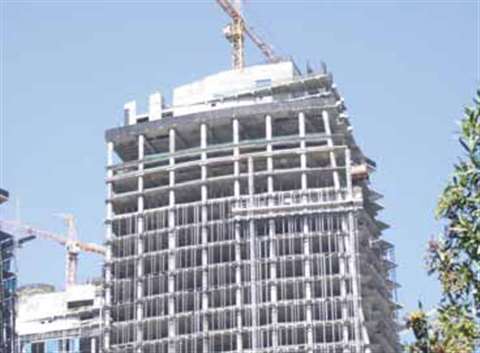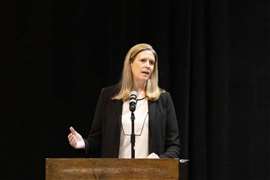Mixed bag
07 May 2008

As AI reported in January last year, the world's fastest hoists, from Pega in the Czech Republic, have been working on the world's tallest structure – the Burj Dubai. That building is now above 600 m in height, and Pega has 15 hoists on site. Eight of them, “super-tall”, variable frequency controlled 3240 BD VFC9 units, have been climbing 425 m masts at 100 m/min for 1 ½ years.
Mr Policar, Pega's industrial hoist director, told AI that the growth in use of hoists in Dubai – 300% over the four years ending in 2006 – flattened out in 2007. He said demand is still “strong” in Dubai and that adoption of hoists is growing elsewhere, particularly in Abu Dhabi.
Although large contractors have been leading the use of the approximately 270 Pega hoists in the Emirates, “There is a growing awareness in small- and medium-sized companies of the advantages of using hoists. Project schedule performance is becoming more important to them, too,” said Mr Policar.
Work platforms might be a different matter. Aamer Hammoudi, agent for Scanclimber in the UAE since November last year, repeats an explanation retarding their adoption: “There is a lot of cheap labour here. There is not a big concern to get time savings.”
However, he sees both extremes of adoption in the market. Mr Hammoudi told AI there are big contractors that have already used mast climbers and will use nothing else, and others who “...are very used to scaffolds.”
He sees signs of change in the latter group. “Something is going on now, platforms are picking up.” One reason, he said, is that municipalities are making more of an effort to improve construction site safety.
Acquisition cost has been a significant factor, according to Mr Hammoudi, in some market segments. He said that the lack of equipment and safety regulations allowed the Chinese to penetrate the market with stripped down, low-cost models having no safety features and manufactured using poor materials.
Mr Hammoudi said contractors accepted such equipment. They used it for one or two projects and threw it away. “Contractors have now had time to figure it out. Now they realize they've had problems with the machines. They have caused delays and penalties.”
Selling directly to contractors in the UAE, Mr Hammoudi said, “Contractors like to buy, not rent.” However new the concept of rental might be in the area, some distributors have told him they are “...willing to build rental fleets.” He thinks it is “...easier to rent for a defined period. There is a lot of [contractor] competition, and renting can help keep their prices down.”
Mohamed Nadi, area sales manager for Safi of Cornuda, Italy, presents a slightly different view from down the coast, in Doha. There Safi has three 21 m, 3.6 t capacity SCAF 2000 work platforms, rented by Boodai Trading Company, working at heights up to 204 m.
Mr Nadi said, “In Dubai, they [contractors] mainly look for price, not efficiency. The companies in Dubai are English. In Doha, there are more German companies. Efficiency is more important there, and so is safety.”
The competition from China, according to Mr Nadi, is in performance, not in price. “China doesn't produce as efficient machines. The GJJ (a Chinese manufacturer) machines are too small.”
Certainly not small are the HEK platforms façade contractor Alico Aluminium is using to clad the new, three-towered Park Place building in Dubai. Alico is using three, single-masted and one twin-masted HEK MSM Super machines, rented from Al Laith Scaffolding in Dubai, to clad the 150 m Gamma tower.
Helping to clad its 61-storey Beta tower, which is 240 m high, will be three single-masted and three double-masted MSMs. Their platform width and length variability will fit the ”perfume bottle-shape” of that structure.






